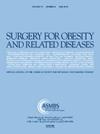减肥手术对孕产妇和新生儿健康的影响:系统回顾和荟萃分析
IF 3.8
3区 医学
Q1 SURGERY
引用次数: 0
摘要
背景:产妇肥胖增加新生儿和产妇并发症的风险。虽然减肥手术的减肥效果已经得到了很好的证实,但其对后续妊娠的影响,特别是对手术后妊娠时间的影响,尚不完全清楚。目的:评估减肥手术对后续妊娠中体重相关、孕产妇和新生儿结局的影响,重点关注手术后妊娠时间。环境:根据系统评价和荟萃分析指南的首选报告项目(PROSPERO ID: CRD42024570170)进行系统评价和荟萃分析。方法:系统评价过程确定了129项符合纳入条件的研究,涉及227,792名减肥手术后怀孕的妇女。分析了体重指数(BMI)变化、胎龄和新生儿出生体重的数据。结果:与手术前BMI相比,孕前BMI降低13.93 kg/m2 (P < 0.001)。在整个产前期间,与非减肥手术对照组相比,BMI没有显著变化。先前接受过减肥手术的患者新生儿出生体重降低257.8 g (P < 0.001)。两组新生儿出生体重(-69.41 g, P = 0.152)和胎龄(- 0.52 g)差异无统计学意义。749 d, P = .826),术后怀孕少于18个月和术后怀孕大于18个月的患者。结论:减重手术成功地降低了孕前母体BMI,但降低了新生儿出生体重,提示需要仔细监测胎儿。手术后的妊娠时间似乎是灵活的,对胎龄或出生体重没有显著影响,这表明临床管理应侧重于个性化的营养和健康监测,而不是固定的指导方针。本文章由计算机程序翻译,如有差异,请以英文原文为准。
The impact of bariatric surgery on maternal and neonatal health: a systematic review and meta-analysis
Background
Maternal obesity increases the risk of neonatal and maternal complications. Although the weight-loss benefits of bariatric surgery are well established, the effects on subsequent pregnancies, particularly regarding timing of pregnancy after surgery, are not yet fully understood
Objectives
To evaluate the impact of bariatric surgery on weight-related, maternal, and neonatal outcomes in subsequent pregnancies, focusing on the timing of pregnancy after surgery.
Setting
A systematic review and meta-analysis was conducted following the Preferred Reporting Items for Systematic Reviews and Meta-Analyses guidelines (PROSPERO ID: CRD42024570170).
Methods
The systematic review process identified 129 studies eligible for inclusion involving 227,792 women who became pregnant after bariatric surgery. Data were analyzed for body mass index (BMI) changes, gestational age, and neonatal birth weight.
Results
Prepregnancy BMI reduced by 13.93 kg/m2 (P < .001) compared with presurgery BMI. There was no significant change in BMI throughout the antenatal period against non–bariatric surgery controls. Neonatal birth weight was 257.8 g lower (P < .001) in patients who had previously undergone bariatric surgery. There was no significant difference in neonatal birth weight (−69.41 g, P = .152) or gestational age (−.749 d, P = .826) in patients who became pregnant fewer than 18 months after surgery and those who became pregnant greater than 18 months after surgery.
Conclusions
Bariatric surgery successfully reduced maternal BMI before pregnancy but lowered neonatal birth weight, indicating the need for careful fetal monitoring. The timing of pregnancy after surgery appears flexible, with no significant impact on gestational age or birth weight, suggesting that clinical management should focus on individualized nutritional and health monitoring rather than fixed guidelines.
求助全文
通过发布文献求助,成功后即可免费获取论文全文。
去求助
来源期刊
CiteScore
6.70
自引率
12.90%
发文量
570
审稿时长
56 days
期刊介绍:
Surgery for Obesity and Related Diseases (SOARD), The Official Journal of the American Society for Metabolic and Bariatric Surgery (ASMBS) and the Brazilian Society for Bariatric Surgery, is an international journal devoted to the publication of peer-reviewed manuscripts of the highest quality with objective data regarding techniques for the treatment of severe obesity. Articles document the effects of surgically induced weight loss on obesity physiological, psychiatric and social co-morbidities.

 求助内容:
求助内容: 应助结果提醒方式:
应助结果提醒方式:


